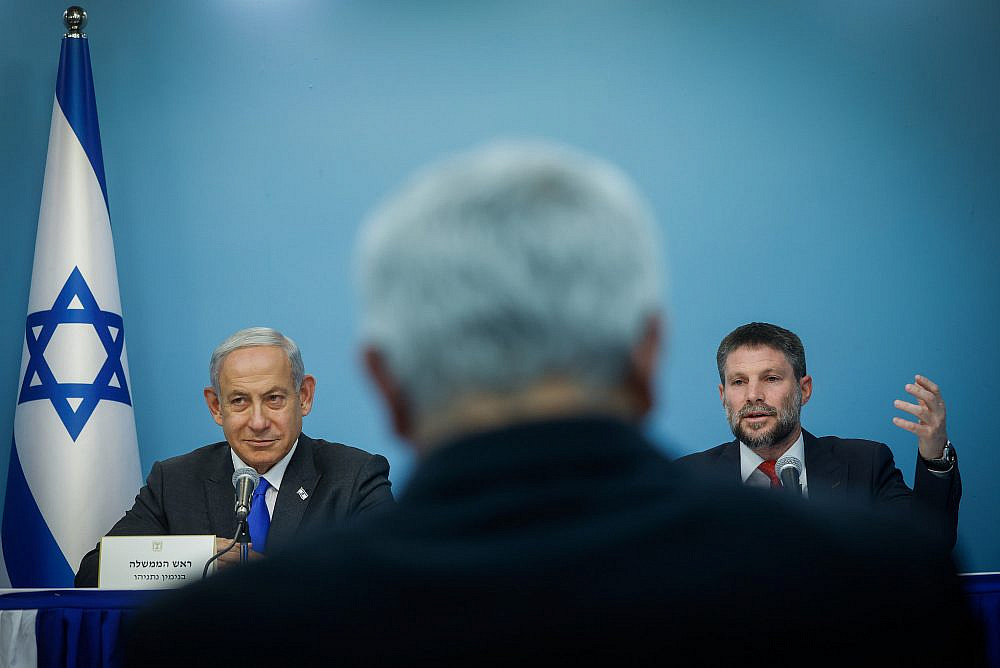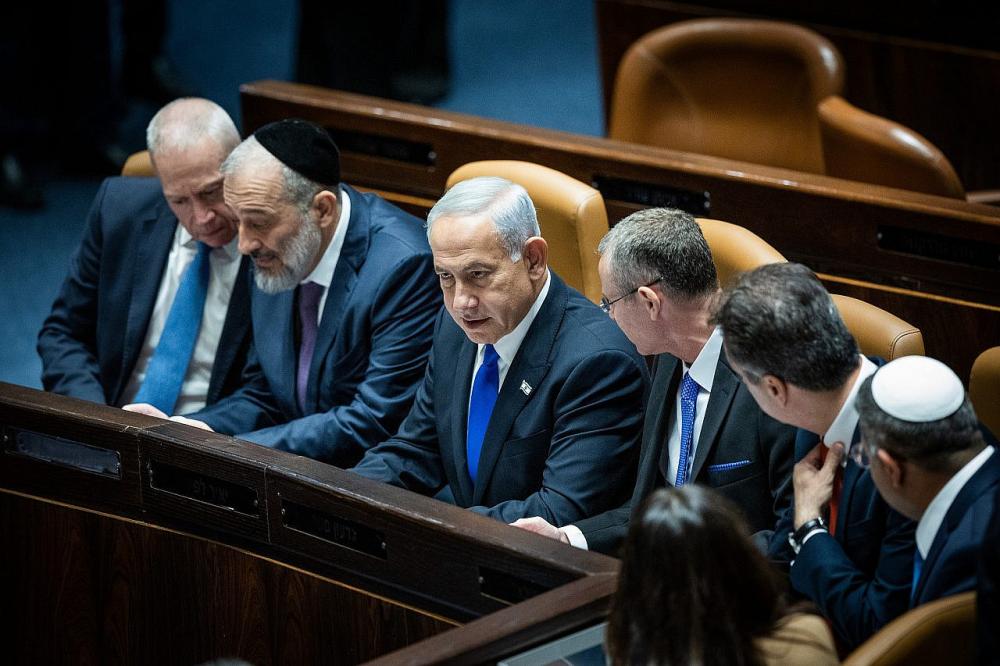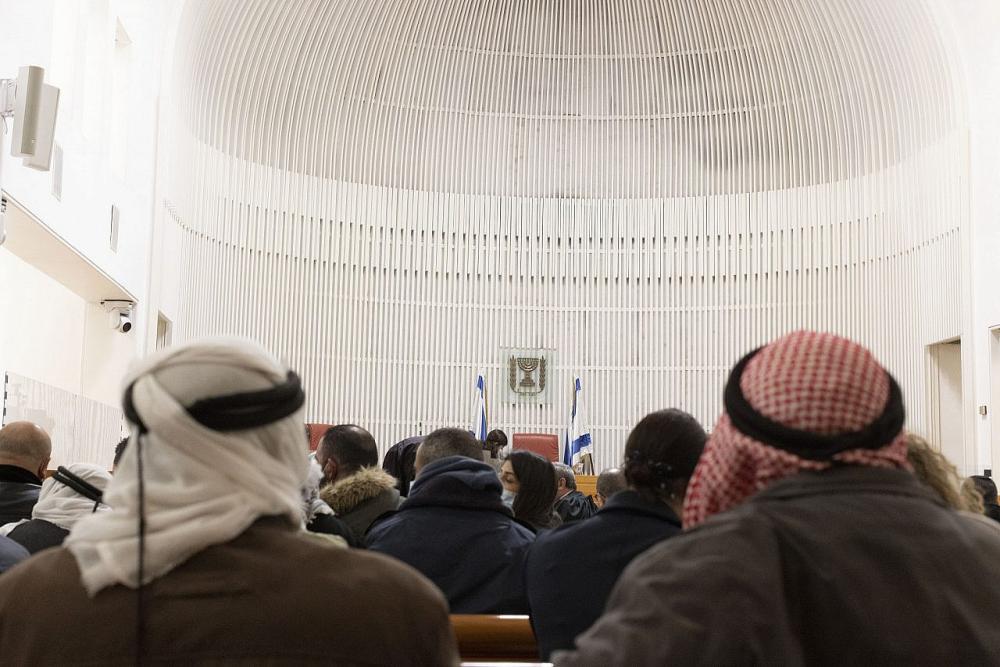The Israeli Right Is the Minority — The Left Need Only Realize It

“Regime change.” This is how former Justice Minister Gideon Sa’ar, himself a right winger, described the reforms that his successor, Yariv Levin, announced last week to radically disempower Israel’s judicial system. Levin’s proposals include passing an “override bill” that would prevent the Supreme Court from striking down Knesset legislation it deems to be in violation of Israel’s Basic Laws; enlarging the Judicial Appointments Committee, enabling the coalition to appoint judges of its choosing; and replacing professional legal advisors that serve government ministries and are answerable to the attorney general with political appointees.
The new government’s justification for this overhaul, which has generated broad opposition from large parts of the Israeli public and even President Herzog, is that it has the mandate of the majority of the Israeli public: the judges are unelected, legal advisors are just advisors, and therefore subordinating judicial authority to the executive branch is, in fact, the foremost expression of democracy.
Some (a minority, it must be said) have argued that the sixth Netanyahu government’s determination to destroy judicial oversight is driven by the constant need to ramp up the occupation, to dispossess the Palestinians from their land, and to strengthen apartheid. Many more believe that Levin is actually doing the bidding of Netanyahu and Shas head Aryeh Deri, in order to spare them their legal troubles, and right as the High Court is about to stage a hearing on the suitability of Deri’s appointment as a minister. The most widespread criticism, however, is that the so-called judicial reform will dismantle democracy and create a tyranny of the majority.

Without going into, for now, the substance of these arguments (all of which are correct in one way or another), almost no one has addressed Levin’s claim that he, and the governing coalition of which he is a part, represent the majority. This statement has been taken as a given, even among most of the center left — which accepts the stance that Israel has a religious, right-wing, settler majority, and the question is how to protect the rights of the minority. But this statement is simply incorrect. The Netanyahu government represents the minority, and therefore its pretenses to governing in the name of the majority and of democracy are, at best, turning a blind eye and, at worst, racism.

Not simply ‘illiberal democracy’
In order to understand what is happening here, we need to look at the guiding principles of the government itself, according to which “he Jewish people has an exclusive and unquestionable right to all areas of the Land of Israel” — that is, the right-wing government is drawing the boundaries at the Jordan River and the Mediterranean Sea. This erasure of the Green Line has been going on for many years, but this time it is clearer than ever that the right has turned every inch between the river and the sea into its playing field. That more and more powers over the occupied West Bank are being transferred from the military to government ministries, which themselves are headed by extreme-right politicians who live in the settlements, is tangible evidence of this process.
As such, comparisons to Poland, Hungary, and Turkey, as made by former Supreme Court President Aharon Barak last weekend, are not relevant. Those countries’ citizens actually have voted in the majority for leaders offering “illiberal democracy,” as Hungarian Prime Minister Viktor Orban likes to call it. Yet none of these countries directly rules, and professes victory over, a territory in which millions of people live without the right to elect people to the institutions that govern them. This is not “illiberal democracy.” It is not democracy at all.
If the right’s arena is, therefore, the entire space between the river and the sea, it is this area that needs to be subject to the question of majority and minority. And here, at least in one key respect — continuing occupation and apartheid — the current government is in a considerable minority. The numbers are clear: according to the calculations of Arnon Soffer, a leading Israeli demographer, almost 15 million people live between the river and the sea, of whom 7.454 million — 49.84 percent — are Jews and “others” (i.e. those who emigrated to Israel under the Law of Return but are not considered halachically Jewish). The other 7.503 million inhabitants — 51.16 percent — are Palestinians on both sides of the Green Line, including Gaza. Palestinians are, in other words, the majority — even if a small one.
It is reasonable to assume that at least 95 percent of Palestinians are opposed to the Israeli occupation and its apartheid rule over the occupied territories. In addition, recent surveys show at least 30 percent of Jews support the idea of two states, entailing an end to Israel’s military rule over Palestinians (31 percent as per the last survey, which did not take into account Jews who support a single democratic state between the river and the sea). With these statistics, we reach a figure of around 65 percent of those living between the river and the sea who are opposed to the current circumstances of Israeli occupation.

The right claims that Soffer’s statistics are inflated, and that only 3.4 million people live in the West Bank (as opposed to the 5.8 million according to Soffer’s count, which is based on figures from the Civil Administration and Israel’s Central Bureau of Statistics). But even if we adopt the right’s data, which is based on hypotheses and not on official statistics, we still arrive at a clear majority of around 59 percent who are opposed to the occupation.
From the moment the right indicates that the entirety of the area between the river and the sea is subject to Israeli sovereignty, it must be responded to in kind. If the right wants to promote the override bill in the name of democracy and majority rule, it needs to address the plain fact that a clear majority between the river and the sea opposes its policies, the settlements, annexation, and quite a few aspects of Jewish supremacy — certainly as it pertains to matters of (Jewish) religion and the public sphere, but also in other areas.
A new consciousness for the Israeli left
Recognizing that the Israeli right actually represents a minority in the territory it rules over and treats as its own is important, not just in order to burst the right’s bogus and hypocritical bubble, but also to create a new consciousness for the Israeli left — to shift it from identifying as a minority to understanding itself as the majority. This applies especially to the Jewish left, since most Palestinians within the Green Line, and even more so Palestinians in the West Bank, East Jerusalem, and the Gaza Strip, do not feel that they are part of the minority between the river and the sea, and certainly not within the Middle East.
This shift from a minority to a majority consciousness has, first and foremost, a psychological effect. The Israeli left, in particular the Jewish left, currently feels under siege, condemned to life as an eternal minority and to guaranteed defeat. Some blame this supposedly preordained loss on demographics, others on the populism that is rising worldwide, and others still claim that 55 years of occupation, and perhaps also over a century of Zionism, were all but destined to bring Israel to where it is today. But if the left were to understand that it is actually part of the majority of those affected by, and opposing, the policies of the Israeli government, it would receive a boost to its self-confidence — and thus also to the belief that it can change the current reality.
But it is not only a matter of psychology. Turning its gaze to the entirety of the space between the river and the sea will also change how the Jewish left defines itself. As soon as the Jewish left begins seeing Palestinians on both sides of the Green Line as its partners in the struggle to end the occupation, it will also begin to reformulate the boundaries of the political community in Israel.
Indeed, this is the primary difference between the right and the center left in Israel today. The right is clear on who belongs to its political community, and it draws strength from this cohesiveness. The moment that significant parts of the Jewish-Israeli center left understand that partnering with Palestinians will grant them an instrument of power against the right, it will be possible to redraw the boundaries of this political community on civil foundations, rather than foundations of ethno-religious segregation, as they are drawn today.
Recognizing that a firm majority between the river and the sea is opposed to the Israeli occupying regime does not necessitate a joint struggle. The situation for Palestinians in the Gaza Strip, who are under siege and ruled by Hamas, is clearly different from that of Palestinians in the West Bank under direct Israeli military occupation, and of course different from that of the Jews and Palestinians within the Green Line who have Israeli citizenship. The struggle will therefore look different for each of these groups. But it is also possible to determine points of collaboration and coordination.
Nor does this mean that the goal is necessarily a single state between the river and the sea. A huge majority of Israel Jews do not accept this idea, nor do the majority of Palestinians on both sides of the Green Line. But what it does mean is that we need to look ahead to a shared future of Jews and Palestinians in this land, because the fates of the two peoples are irreversibly intertwined.
[Meron Rapoport is an editor at Local Call.]
A version of this article first appeared in Hebrew on Local Call. Read it here.
+972 Magazine is an independent, nonprofit media organization of Israeli and Palestinian journalists that relies on the support of readers like you.
Through our groundbreaking reporting on the ground and critical analysis, we spotlight the people and communities working to oppose occupation and apartheid, and promote justice and equality for all those living between the river and the sea.
In order to foster real and meaningful change, we have to be able to do this work in the long run. That means paying our Palestinian and Israeli journalists, as well as providing them with the necessary legal protections as they report from the frontlines. We have to ensure that we keep reaching millions of people around the world — from policymakers to grassroots activists to regular readers — with the reliable information they need. We remain committed to allowing people access to this information with no paywalls or ads. To do all that, we need your support.
